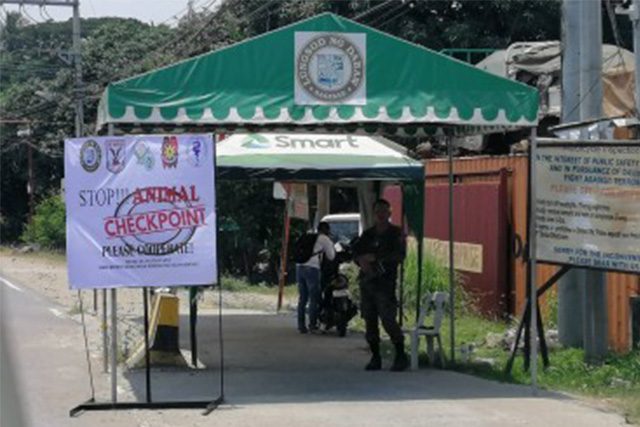Officials of Barangay San Antonio in Davao City were recently called out for imposing a punishment that poses threat on the health of quarantine protocol violators as the nation faces a public health crisis.
This week, some news outlets reported that nine individuals were made to swim in a filthy drainage canal after they violated the imposed curfew hours and the liquor ban set amid the community quarantine.
Residents are not supposed to go out from 9 p.m. to 5 a.m. under the city’s guidelines.
On May 30, Facebook user Reymon Ballena Tulibao shared a video of this sanction. He questioned it and expressed his concern on its health risks.
“Barangay San Antonio, Agdao Kagawad Capuyan, what is this all about? It doesn’t mean that they violated the curfew, they already deserve to be bathed with canal water. Does this mean it is okay for you that they will catch leptospirosis?” he wrote.
Kagawad CAPUYAN sa Barangay San Antonio Agdao unsa mani? porket dinakpan sa CURFEW atubangan ra sa balay paligoon na sa…
Posted by Reymon Ballena Tulibao on Saturday, May 30, 2020
Leptospirosis is a bacterial disease that can infect humans if they have direct contact with the urine of infected animals or in a urine-contaminated environment such as drainage canals.
It can enter the body through cuts or skin abrasions, as well as mucous membranes of the mouth, nose and eyes.
Another Facebook post by Zosimo Uyanguren, an alleged curfew violator, similarly expressed his health concerns on the unusual punishment.
“We will not die because of COVID-19, we will die from leptospirosis after you let us swim in the filthy canal,” he wrote.
Other curfew violators also shared their fears about the risky sanction.
“Ang dumi niyan. Sinabihan nila kami na mag-mask eh mas matindi pa ‘yan kaysa sa COVID sa dami ng insekto,” Jay Lloyd Purisima said in an interview.
“Nakainom kami ng tubig niyan. Single father ako tapos ito lang ang kinabubuhay namin, ang pamamasada, kukunin pa nila,” Frederick Matias said.
Davao City Mayor Sara Duterte-Carpio condemned the incident and called the punishment “inhumane.”
“Is it humane to force someone to swim in a drainage canal? No, it is not humane. What is humane, is when you asked them to clean the drainage canal. Now, I am calling the attention of the people behind such idea,” she said.
Davao City Police Office Spokesperson Police Captain Rose Aguilar said that the authorities involved will face criminal and administrative charges for the incident.
“Sasampahan natin ng criminal at administrative sanction, kasama rin ang barangay official o kung sino man ang sangkot sa isyu na ito,” she said.
Potential exposure to bacteria and viruses
The punishment’s potential health impacts didn’t escape some Filipinos who called out the nature of the sanction and how it could put an individual’s health at risk.
Physician Jairus Cabajar pointed out that curfew hours are imposed to “lessen the risks of getting infection” since it aims to minimize the movement of the public.
“Didn’t they realize how inhumane and how counterproductive this is? Didn’t they realize that the curfew aims to lessen the risk getting an infection? Kaninong matalinong idea ang palanguyin sila sa imburnal, which guess what, houses tons of bacteria,” he tweeted.
Cabajar’s comment has since earned more than 7,900 retweets and more than 30,000 likes on the microblogging platform.
“We’re in the middle of a pandemic, having a clean and healthy body is the top priority, yet here you are, exposing people to a whole lot of germs or even viruses because they violated protocols! WTF??” another Filipino wrote.
A drainage canal is an artificial canal built to drain water from an area with no natural outlet for precipitation accumulation. It is built to remove surface or sub-surface water from infrastructures and prevent waterlogging.
It usually contains wastewater accumulated from households and establishments.
Among the diseases that can be acquired from such waters include malaria, schistosomiasis and lymphatic filariasis. These water-borne diseases are caused by bacteria, viruses and parasities such as protozoa and helminths.
The United States’ National Center for Biotechnology Information noted that filthy drainage canals could be an occluded source of sanitation-related outbreaks which include multi-resistant bacteria.










